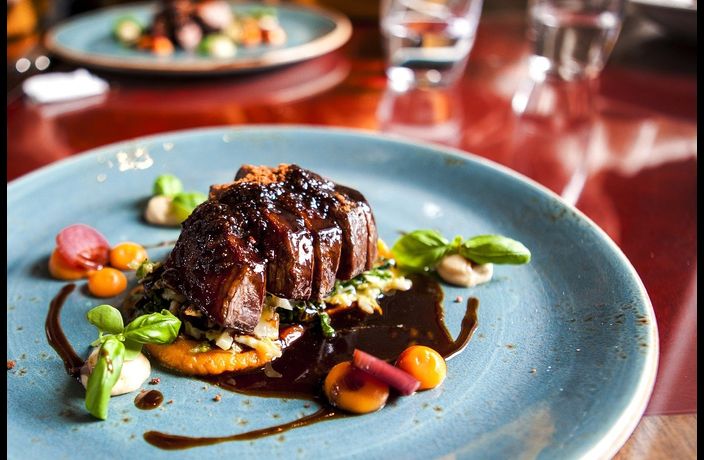Given the deep passion many in France have for cuisine, it’s perhaps not surprising that French gastronomy was inscribed by UNESCO on its List of Intangible Cultural Heritage in 2010.
Since 2015, an annual event entitled ‘Good France,’ also known as ‘Goût de France’ (Taste of France) in French, has brought that very gastronomy to 156 countries across five continents, including here in China.
Nowadays, a whole host of French restaurants can be found across the Middle Kingdom, largely in first- and second-tier cities.
Getting French food into the Chinese market is not without its difficulties. For one thing, translating the names of French dishes into Chinese can be challenging even for the most adept of linguists.
However, in spite of any difficulties, both French and Chinese people are united by their shared passion for food.
The sixth edition of the ‘Good France’ event runs from Thursday, October 14 until Friday, October 22 and gives diners a chance to indulge in a range of dishes. Participating restaurants are in Beijing and Qingdao.

French Ambassador to China Mr. Laurent Bili giving an address. Image via Ambassade de France en Chine
We reached out to French Ambassador to China Mr. Laurent Bili and asked about the origins of ‘Good France,’ the importance of sustainability in the food industry and how cuisine can build bridges between cultures.
This is the sixth ‘Good France’ event. Could you explain the purpose of this event and why it is so important?
‘Goût de France,’ known as ‘Good France’ in English, was created in 2015 by the French Ministry for Europe and Foreign Affairs and Alain Ducasse (a stalwart chef of French cuisine).
It celebrates French gastronomy which was inscribed by UNESCO on its List of Intangible Cultural Heritage in 2010. The event involves thousands of dinners in restaurants around the world. In six years, ‘Good France’ has established itself as an unmissable gastronomic event with growing success over the years.
The sixth edition, that will take place all around the world from October 14 to 22, 2021, is very poignant as it occurs after the upheaval due to the worldwide COVID-19 pandemic. In this context, I think that what French gastronomy has to offer is much needed – a certain ‘art de vivre,’ a universal sense of togetherness, and a festive meal bringing people together for an occasion to enjoy the art of good eating and drinking.
This year’s edition will focus on responsible gastronomy and the French region of Centre Val de Loire (Loire Valley), where the gastronomic meal of the French was developed during the Renaissance in the Loire castles. Both Chinese and French dishes share the specificity of being rather poetic, which tends to make any meal a proper journey.
Furthermore, ‘Good France’ 2021 will be characterized by a marked commitment to a cuisine that is more respectful of the planet's resources. This is in line with this year's other major international events, notably the Kunming COP 15 (UN Biodiversity Conference) that started this week.
Over the next few months, this event aims to highlight the expertise and convictions of these women and men, who are passing on their tastes and values, and each day are shaping the gastronomy of the future.
How important is sustainable gastronomy for ‘Good France’?
As I just mentioned, this year’s edition will have a strong focus on sustainable gastronomy.
Yet, sustainability has always been a matter of great importance within the scope of ‘Good France.’ French gastronomy places emphasis on delicious food made using local and natural ingredients that reflect the diversity of the French nation itself.
For instance, the Loire Valley, known as the ‘Garden of France,’ boasts various fruity wines, goat cheese, rillettes (pâté made of minced pork and other ingredients) and the famous apple pie ‘tarte tatin.’
In order to strengthen its commitment to global environmental action, ‘Good France’ published its first White Paper on Sustainable Gastronomy in 2019. As the food writer Jean-Anthelme Brillat-Savarin once said, “the fate of nations depends on how they feed themselves.”
The names of French dishes are often very particular. Are there ever any difficulties translating the names of the dishes into Chinese?
Both Chinese and French dishes share the specificity of being rather poetic, which tends to make any meal a proper journey.
Usually in French menus, the dish’s name is composed from the ingredients it uses and the way of cooking it. When translated into Chinese, the dish’s name could be really long, such as ‘cassoulet,’ a dish that derives from the clay pot used to prepare it. I know that sometimes the chef of the French Residence in Beijing has to explain some dishes. Here are a few examples:
Cabillaud et Saint-Jacques en ‘cassoulet’ – (a type of fish casserole) 卡酥来鳕鱼扇贝砂锅
La tarte tatin en bûche, gelée de calvados, glace à la vanille – (a type of apple tart with vanilla ice cream) 苹果蛋卷,卡尔瓦多斯酒味果冻和香草冰淇淋
Some specific terms like amuse-bouche or canape are difficult to translate. Even when translated, these can still be difficult for Chinese people to understand because the meaning does not exist in Chinese culinary traditions. This is why so much explanation is needed.
Explaining these kinds of things is partly the purpose of such initiatives as ‘Good France,’ which do not only promote delicious foods, but also help to share French culture.
Chinese people’s dining habits usually include sharing dishes between multiple diners, perhaps using a lazy Susan. Can this be a barrier to stop Chinese people enjoying French food?
Even though culinary social practices differ strongly between France and China, I don’t believe this is an obstacle at all.
Many Chinese and French people share the same passion for food and bringing people together around a meal to celebrate events. Chinese people know better than anyone that gastronomy is an essential element of both our cultures and that both our people have elevated it to an art form.
The fact that some French restaurants in Beijing are owned by Chinese people that love French food illustrates how gastronomy tends to build bridges between French and Chinese cultures.
What can Chinese people or expats living in China do to discover more about French cuisine?
Try the different menus offered at ‘Good France!’ In Beijing, they actually somewhat reflect the different trends of French restaurants – a familial and cozy atmosphere, a bistro and high-end gastronomy.
To find out about the menus available in Beijing and Qingdao as part of ‘Good France,’ scan the QR code below:

[Cover image via Pixabay]






















0 User Comments